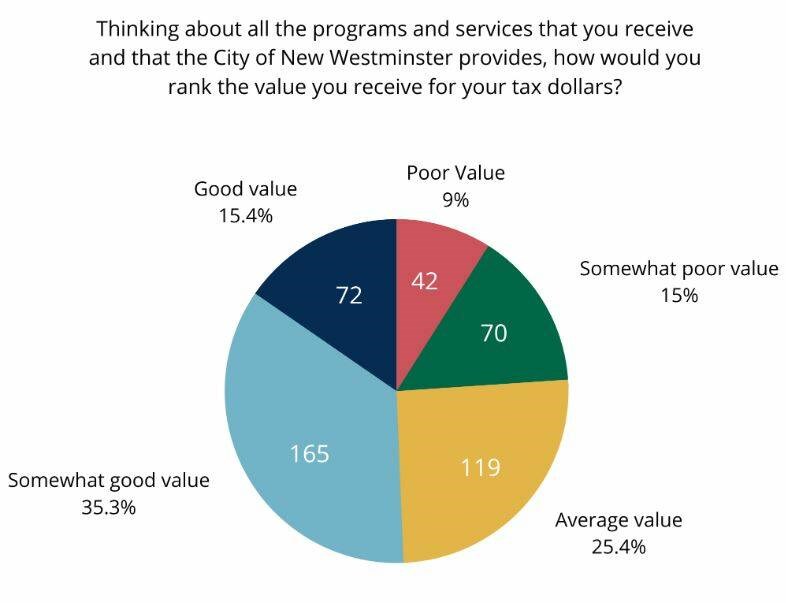Close to 500 people took the time to share their thoughts with the City of New Westminster about its 2024 budget.
As part of its 2024 budget process, the city recently gave residents and businesses a chance to weigh in with their thoughts on the budget. That included asking what projects they’d like to see prioritized, such as bike lanes, sports infrastructure, road repairs, train whistle cessation and climate-action retrofits.
In May, city council endorsed engagement objectives and an engagement timeline associated with the 2024 budget. That plan included engagement on Be Heard New West, the city’s online engagement space, and targeted workshops with underrepresented groups.
“We heard from 470 community members on their priorities for how the city should spend its money,” said an update on Be Heard. “Online public engagement has now concluded. Over the next few weeks, staff are continuing with targeted outreach to specific groups in New West, like renters and newcomers.”
While the results of all the city’s engagement activities will be shared later this summer, staff provided a few highlights of the online survey, which concluded on July 10. This included the response to a question about people’s thoughts on the programs and services provided the city — and the value received for their tax dollars. (See pie chart)
“Key factors for the 2024 city budget in particular include aligning the city’s work plans with council’s new strategic priorities, the ongoing rise in inflation, increased population, and new staff and other resources that will be needed to operate the new təməsew̓txʷ Aquatic and Community Centre (which is set to open in 2024),” said the update. “Another key budget driver includes third-party funding like the provincial support from the Growing Communities Fund and opportunities for other grants.”
New Westminster is looking to increase public engagement in the development of next year’s budget, after having minimal engagement around the 2023 budget. That was due to the time needed to do a “comprehensive” onboarding of the new council, following the October 2022 civic election.
The city’s goal in recent years has been to approve its draft financial plan by the end of the year, but this year’s budget wasn’t approved until late April.
“The shifting of the annual budget timelines did have an impact on community engagement,” said a May 8 report to council.
At that time, council supported the idea of having public engagement before city departments begin drafting their budgets, rather than in the fall, which is when it has typically occurred. By fall, staff have already begun working on their departments’ budgets.
“This demonstrates authentic engagement and gives staff the best opportunity to consider and incorporate community input into their draft budgets,” said the report. “This timeline means engagement results must be tabulated and shared with staff across the organization by August at the latest.”
A report to council noted the city’s budget engagement has a number of objectives, including seeking input from residents and business operators on their level of support for council’s strategic priorities (which are a guiding principles for how funds are allocated), how they rate the overall value they receive for their tax dollars and what their “tolerance” is for tax increases. Input was also sought on residents’ and businesses’ priorities for future capital spending, as well as their preferences for measures to balance the city’s budget — such as cutting or reducing services, increasing taxes, increasing taxes or doing a combination of taxes and fees.
The proposed timeline for the 2024 budget will see staff reporting back to council at the Aug. 28 meeting with a “what we heard” report about the findings of the public engagement. The city’s plan is to have council workshops about the budget in November, release a draft budget and seek comments in December, and approve the 2024 budget in January 2024.




